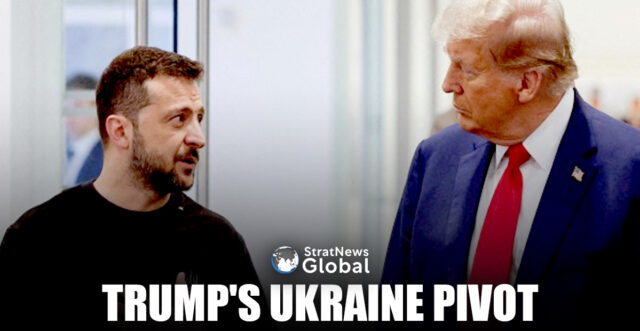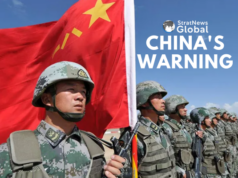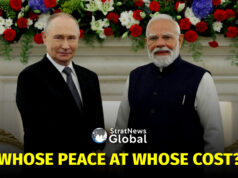President Donald Trump’s dramatic but expected pivot in U.S. policy toward Ukraine has caused much consternation and debate worldwide.
This shift not only affects Ukraine but also has far-reaching implications for Europe, Russia, and the broader global order.
Trump’s decision to engage directly with Russia, sidelining Ukraine from peace talks, has left Kyiv extremely vulnerable.
By suggesting that Ukraine should have avoided conflict through negotiations and calling President Volodymyr Zelenskyy a “dictator without elections,” and a “modestly successful comedian,” Trump has undermined Ukraine’s position on the world stage, while leaving rattled European leaders pondering their next move.
“The United States has spent $200 Billion Dollars more than Europe, and Europe’s money is guaranteed, while the United States will get nothing back,” Trump said on a post on Truth Social.
Without strong backing from the U.S., Ukraine faces increased pressure to make concessions that could compromise its territorial integrity and national security.
“Why didn’t Sleepy Joe Biden demand Equalization, in that this War is far more important to Europe than it is to us,” asks Trump in his post. “We have a big, beautiful Ocean as separation. On top of this, Zelenskyy admits that half of the money we sent him is “MISSING.” He refuses to have Elections, is very low in Ukrainian Polls, and the only thing he was good at was playing Biden “like a fiddle.”
“A Dictator without Elections, Zelenskyy better move fast or he is not going to have a Country left. In the meantime, we are successfully negotiating an end to the War with Russia, something all admit only “TRUMP,” and the Trump Administration, can do. Biden never tried, Europe has failed to bring Peace, and Zelenskyy probably wants to keep the “gravy train” going. I love Ukraine, but Zelenskyy has done a terrible job, his Country is shattered, and MILLIONS have unnecessarily died And so it continues…,” Trump concludes.
The U.S.’s unilateral approach has unsettled European allies, who now face the prospect of reduced American support. This uncertainty is likely to push Europe toward greater defence autonomy, with countries such as Germany, France, and Poland advocating for stronger regional security framework, and not depend on NATO.
However, this move could also expose divisions within the European Union regarding how to handle relations with Russia and manage defence strategies without full U.S. backing.
Zelenskyy’s decision to reject an agreement that would have granted American companies a 50 percent stake in Ukraine’s rare earth mineral reserves might also be a factor behind Trump’s tough talk. Trump had been advocating for the deal, previously asserting that he expected “the equivalent of $500 billion in rare earth minerals” in exchange for continued U.S. aid.
Zelenskyy turned down the proposal, emphasizing that it failed to safeguard Ukraine’s interests and lacked the necessary security assurances.
Trump seems keen to resurrect the deal. “I think I’m gonna resurrect it. You know, we’ll see what happens, but I’m gonna resurrect it or things are gonna not make him too happy. And look, it’s time for elections, haven’t had an election in a long time,” Forbes quoted Trump as telling journalists aboard Air Force One on Wednesday.
For Russia, Trump’s approach represents a diplomatic win. By securing direct negotiations with the U.S., Russia gains leverage in shaping the outcome of the conflict. This could result in softened sanctions, increased recognition of its territorial claims, and greater influence in Eastern Europe. Such gains would not only solidify Russia’s regional power but also embolden it to pursue similar strategies elsewhere, argue some analysts.
Domestically, it is not just the Democrats who oppose Trump’s move on Ukraine.
“I think Vladimir Putin started the war,” Republican Senator from Louisiana John Kennedy was quoted as saying. “I also believe, from bitter experience, that Vladimir Putin is a gangster. He’s a gangster with a black heart” who has Soviet dictator Josef Stalin’s “taste for blood,” he said.
Trump’s willingness to negotiate territorial settlements also sets a disturbing precedent for international law. It challenges the principle of sovereign borders, potentially encouraging other nations to pursue aggressive territorial claims, they believe.
As a headline on CNN put it, “As Trump’s attacks on Zelensky turn personal, there’s only one winner: Russia”
The U.S.’s shift away from traditional alliances may also prompt countries to seek new partnerships. Europe could strengthen its internal defence cooperation, while Asian nations might lean more heavily toward regional powers like Japan, India, or even China. This could lead to a more fragmented global order, with multiple centres of power emerging in place of the current U.S.-led system.
No matter how you slice it, we are clearly looking at a radical reshuffle of the global order.
In a career spanning three decades and counting, Ramananda (Ram to his friends) has been the foreign editor of The Telegraph, Outlook Magazine and the New Indian Express. He helped set up rediff.com’s editorial operations in San Jose and New York, helmed sify.com, and was the founder editor of India.com.
His work has featured in national and international publications like the Al Jazeera Centre for Studies, Global Times and Ashahi Shimbun. But his one constant over all these years, he says, has been the attempt to understand rising India’s place in the world.
He can rustle up a mean salad, his oil-less pepper chicken is to die for, and all it takes is some beer and rhythm and blues to rock his soul.
Talk to him about foreign and strategic affairs, media, South Asia, China, and of course India.





